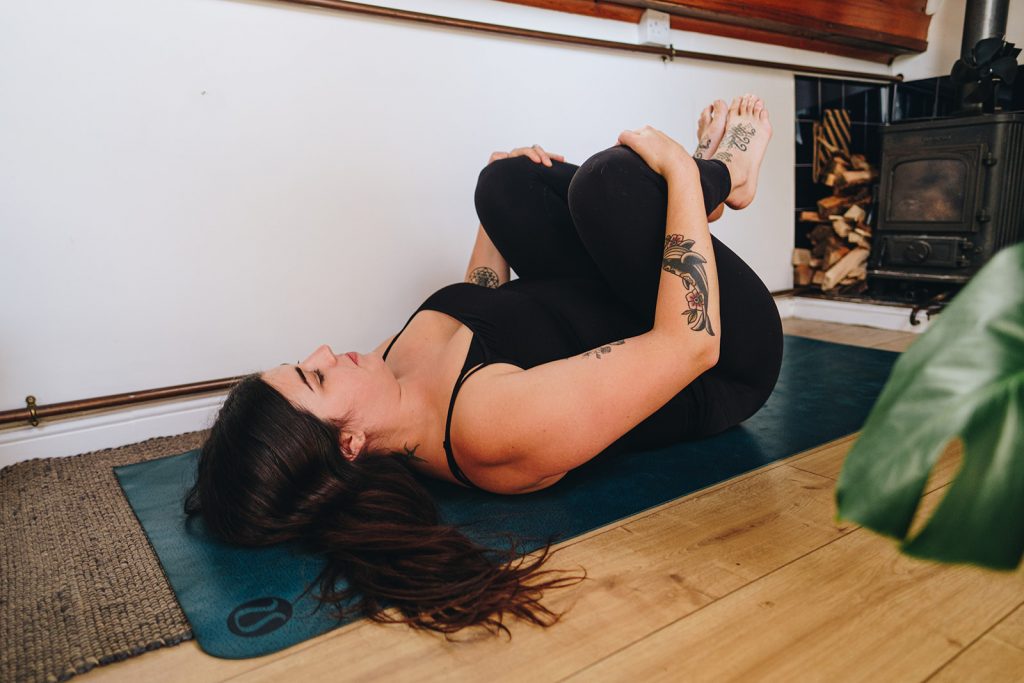A yoga practice is like any long term relationship, full of highs and lows, change and stagnation, love and resistance. We can apply these dynamics to most things in life: friendships, jobs, social media, hobbies, anything we invest time, effort, and meaning in.
Yet, there is something different about yoga. Something which can in many ways make or break not just our relationship to yoga, but also our relationship to ourselves. Because a fundamental aspect of yoga (one that is often ignored across social media and culture in favour of gymnastic postures) is cultivating embodiment — to be embodied is not just to be within, present and connected to the body, but to honour ourselves, as we are, in each moment.
With Nourish’s upcoming short courses on Yoga, Trauma and the Nervous System (currently fully booked, check back for future dates), Teaching Yin Yoga: An Introduction, and Introduction to Restorative Yoga, as well as the return of our popular Rest, Rest, Rest two-hour practice on 30th May, I have been reflecting on the necessity and challenges of being in the body, and how yoga has failed, as well as revolutionised, our relationship to self. The concept I keep coming back to in these reflections is self-compassion.
The True Meaning of Self-Compassion
Yoga is not all “love and light”. Many of us harbour critical feelings towards ourselves, and for some of us being made physically, emotionally, or mentally aware of ourselves is profoundly challenging and — I do not use this word lightly — triggering. One of my core tenets as a yoga facilitator (and something which infuses all of Nourish’s trainings and offerings, from the Community Library to our mentoring program) is to create spaces for my students where they can, on their own terms, arrive at themselves in a compassionate context. Over the years, I have noted how radically different this is to much of contemporary yoga, which is often underpinned by transforming the body to be more flexible, stronger, more toned. Or changing the mind to be more focused and calm, and even overhauling our personalities to be only peaceful and uncritical. This is very far from most people’s lived reality, and perpetuating these as yoga’s goals is toxic.
Working towards self-compassion, however, creates more space to be, accept, and possibly (although this is NOT essential, as it is impossible for so many people), love ourselves. After all, we can be uncomfortable and have self-compassion for that feeling. We can wish for personal change and have self-compassion for ourselves as we are. We can feel negatively about ourselves , have regrets and, in short, massively screw up, and still have self-compassion.
Cultivating self-compassion can be one of the most useful, timeless and profound gifts a yoga practice can give. Through injury, age, stress, and challenge, it is self-compassion that will help support us –– not open hips, a strong core, or holding your breath for extended periods.

Self-Compassion for the Body
We relate to the body in so many different ways. We may feel acutely aware of it or disconnected from it; it may be a place of refuge or one of physical or psychological pain. Our relationship to our body may oscillate between a myriad of feelings and sensations.
It is important to acknowledge that in the context of yoga there is no right way to feel in the body, and more broadly there is no right body for the practice. Unfortunately, this goes against much of the image and messaging that contemporary yoga portrays. Contemporary yoga culture has failed in its consideration and representation of marginalised bodies. Acknowledging, challenging, and rectifying this is so important to the work we do at Nourish, which is partly why we offer teacher training scholarships throughout the year for people who identify as LGBTQIA+ and/or BAME.
Perhaps less overtly, but equally as destructive, are the prescriptive instructions on sensations yoga teachers often say: ‘you should feel this in your hip/glute/shoulder’, ‘this will open/strengthen/stretch your X, Y, Z’, ‘this feels great/challenging/uncomfortable’. My question to these statements is, ‘for whom?’. For you, the individual teacher perhaps, but you cannot make that assumption for your students.
There is no right, normal, or one way to experience yoga or the body. We may not be able to feel all or certain parts of our body, perhaps all or some of the time. This may stem from trauma, a musculoskeletal or neurological condition. What we personally perceive to be pleasurable, painful, or neutral won’t equate to others experiences of those sensations. Being in our bodies, or touching base with the broader self in general, may be a deeply uncomfortable or frightening experience. Yoga, at its very best can, with patience and self-compassion, teach us to navigate this. It may not make us feel total self-love, but it can guide us in how to be okay and accepting of ourselves even when we experience challenging feelings and sensations. This is self-compassion.
How Self-Compassion Transforms Your Practice
Self-compassion not only shifts how you relate to yourself in your yoga practice, and certainly how you teach and relate to your students as a yoga teacher, but also deepens your practice in unexpected ways.
Within my own practice, I have found that once I truly and consistently started practising from a place of self-compassion (because it takes time, and slip-ups are inevitable), I tend to do less. Less striving and pushing, and often less asana practice in general. I may replace it with slower practices or meditation, but often I read a book, or have a lie-in, or call a friend instead. As a result, I feel more supported in myself and there is more joy and acceptance in my life, towards myself and others.
Yoga can offer us so much, and it certainly teaches us discipline, but it should never be a punishment. All too often I hear of people trying to whip themselves into shape, or berating themselves for not being or behaving in a certain way. For yoga to truly honour the realities of the multitudes of the human condition, it must come from a place of self-compassion.
Inquiries to Help Cultivate Self-Compassion
- Reduce comparisons — mute or unfollow social media accounts that cause you to lean into comparison or self-criticism. This is something I did on my personal Instagram a few years ago and the effect on my well being and ability to cultivate self-compassion was profound.
- Acknowledge and adjust your attitude to practice — notice when you are approaching your practice as a ‘to do’ list of things to accomplish or to ‘fix’ certain areas of your body. It can take time to recognise or admit that these aspects are present in your practice, so be patient with yourself. Instead, try inviting an attitude of ‘saying hello’ to your body through your practice, like you would say hello to an old friend.
- Expand your practice beyond asana — can you cultivate an appreciation of activities like reading, journaling, walking or reading as part of your yoga practice? Being able to integrate activities you enjoy with the qualities you are cultivating in your yoga practice, not only can help to foster greater ease and joy when you are practising yoga, but is part of experiencing yoga as a lived philosophy.
- Find a practice buddy — even if you’re not actually practising together online at the same time, finding a pal to talk about your yoga practice with can be hugely supportive.
- Journal — Similar to reflecting on your practice with a buddy, journaling about your practice experience can be a wonderful additional support. Sometimes we experience unexpected realisations when we take the time to write about our practice.
- Checking in — A strategy I frequently return to is noticing the things I say to myself, and considering whether I’d use the same language with my dearest friends. Often it’s a very clear ‘NO’ and that makes it so much easier to notice uncompassionate thoughts when they arise. This is also a great way to make friends with yourself, something that may sound odd or trite, but as your own life long companion something that is truly worthwhile.

3 thoughts on “Cultivating Self-Compassion Through Yoga”
Pingback: How to: Loving-Kindness (Metta) Meditation – Nourish Yoga Training
Pingback: Yoga and Healing – Nourish Yoga Training
Pingback: Yoga Self-Practice for Summer – Nourish Yoga Training